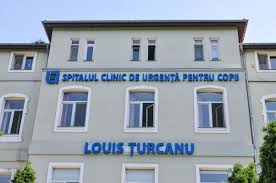
Spitalul Clinic de Urgenta pentru Copii “Louis Turcanu” Timisoara
Doctir Iosif Nemoianu Street no 2
400011 TIMISOARA
ROMANIA
Lead
Pr Puiu Maria
Phone: +40 732890505
Fax: +40 256-201.976
Mail: maria_puiu@umft.ro
Scope
Ro-NMCA-ID is a network within the ITHACA European Reference Network (ERN) that covers syndromic and non-syndromic conditions with developmental anomalies and/or intellectual disability (ID). Ro-NMCA-ID aims to provide integrated services and ensure continuity of care for people with rare congenital anomalies and/or ID from Romania. The scope of expertise of Ro-NMCA-ID includes:
- multiple congenital anomalies and intellectual disability (especially syndromes caused by X linked intellectual disability, chromosomal rearrangements and microdeletions/duplications); RASopathies, ciliopathies and other.
Service to patients
Through its regional centers Ro-NMCA-ID, the network contributes to patient care by offering clinical evaluation and diagnosis, genetic testing, familial screening, genetic counseling, treatment, prenatal diagnosis, follow up and coordination of the medical care and education of patients in the field of developmental anomalies.
Organization of the ITHACA ERN – Ro-NMCA-ID
Ro-NMCA-ID is based on five existing structures with previous collaboration. The four hospitals have expertise in diagnostic, preventive and treatment procedures in genetic diseases, while NoRo center offers educational and supportive therapy. These are:
- Louis Turcanu Paediatric Emergency Hospital Timisoara (Regional Centre for Medical Genetics Timis – coordinator Prof Maria Puiu);
- County Emergency Hospital Craiova (Regional Centre for Medical Genetics Dolj)
- “Sfanta Maria” Paediatric Emergency Hospital Iasi (Regional Centre for Medical Genetics Iasi – coordinator: Prof Cristina Rusu)
- Municipal Hospital ”Dr. Gavril Curteanu” Oradea (Regional Centre for Medical Genetics Bihor- coordinator Dr. Claudia Jurca)
- NoRo Pilot Reference Centre for Rare Diseases in Zalau (coordinator: Dorica Dan);
Ro-NMCA-ID offers full coverage of general and specialized medical care for children, adults and pregnant women. The Regional Centers of Medical Genetics from Timisoara, Iasi, Oradea and Craiova were created in 2014 on mature existing genetic departments. Each have hospital beds (inpatient care), outpatient care facilities and laboratories.
The Centre in Timisoara brings a rich experience with pediatric patients in the clinical setting coupled with state of the art laboratory equipment (SNP array and NGS sequencing). The team from Timisoara has gained increased expertise with Prader Willi Syndrome. The Centre in Timisoara collaborates with the Centre of Genomic Medicine – University of Medicine Timisoara (http://genomica.umft.ro/) that includes:
- Next Generation Sequencing Lab (Illumina Technology MySeq, HiSeq2500),
- Microarray Lab (InnoScan and IScan Illumina),
- Quantitative Genotyping Lab,
- Bio IT Lab, Pre PCR Lab,
- Cytogenetic lab, Translational Research Lab
- Metabolomics and proteomic labs.
The Centre of in Craiova has a strong expertise in prenatal genetic screening and diagnosis of chromosomal disorders, but also with X-linked intellectual disabilities and microdeletions / microduplications syndromes testing. The laboratory within the Regional Centre of Medical Genetics fromCraiova performs:
- conventional cytogenetic analysis,
- RT-PCR based methods(ViiA7-Applied Biosystems),
- QF-PCR (ABI Genetic Analyzer 3730);
- MLPA (CEQ8000-Beckman Coulter sequencer),
- arrayCGH/CGH + SNParray(Agilent) and
- Sanger sequencing(CEQ8000-Beckman Coulter sequencer)
- Next Generation Sequncing
”Sfanta Maria” Paediatric Emergency Clinical Hospital Iasi hasbroad expertise in dysmorphology and includes a Medical Genetics Centre since 1985. It covers approximately 20% of the Romanian population. The laboratory services are provided through cooperation with the Molecular Medicine Platform of the University of Medicine and Pharmacy in Iasi (especially X linked intellectual disability, subtelomeric rearrangements and microdeletions/microduplications)
The Regional Center of Medical Genetics Oradea has broad expertise in dysmorphology and a long term tradition (more than 30 years) in the diagnosis of multiple congenital anomalies and intellectual disability.
The NoRo Centre completes the network with supportive medical and social services, patient/family empowerment, alongside efforts to raise awareness for rare diseases. It is a resource center providing therapeutic and medical services. It is accredited for medical and social services, as a training provider and for research capacity. Its main objective is to provide integrated social and care services to people affected by rare diseases and their families through improving access to care, information, therapies, research, and education. NoRo has an interdisciplinary team of 21 professionals (2 doctors, 2 nurses, 3 psychologists, 5 special education teachers, 2 occupational therapists, 2 kineto therapists, 4 case managers, etc.) The NoRo Centre regularly organizes training and care for patients with rare diseases: groups of 12-14 patients with the same rare disease participate every month in one week sessions where they are provided with therapy, education, and rehabilitation. It also provides training for a weekly group of 12 young people with intellectual disabilities with the aim to teach them independent life skills (3 days/ week). Moreover, the Centre is in charge of a day care centre that organizes individual and group therapy for around 50 children with rare diseases and autistic spectrum disorders. A help line is available for clients or professionals looking for information and support and it is part of Eurordis network of HelpLines.
